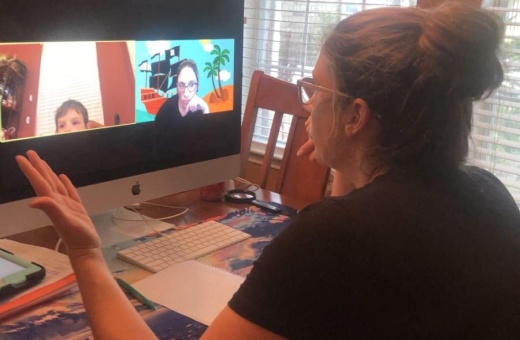For Monkey Business Therapy on Kuykendahl Road in Tomball, co-owner Aimee Hicks, a practicing speech pathologist, said it was in the best interest of clients who are often medically compromised to transition to telehealth services in response to the coronavirus outbreak.
“We work with kids with a lot of medical complications—metabolic issues, various syndromes; immunity is a big factor for a lot of the kids that we work with,” Hicks said. “So, by and large, most of our kids have a lot of challenges that they're overcoming, and getting sick is really hard on them.”
According to Hicks, clients are accustomed to therapists utilizing a hands-on, play-based approach to sessions, which are often conducted in their own home. Because of this, Hicks said, challenges can arise when trying to keep students’ attention through a screen.
“It's hard because our whole company is built around play, ... and playing through a computer screen is a lot different than playing on the floor of their home,” Hicks said. “But, it's been a great experience; we've had really effective sessions.”
Despite the difficulties, Hicks said telehealth has been a good alternative to continue services given the current circumstances.
“For the kids that are participating [in telehealth], I don't feel like the quality of the services they're receiving has been impacted,” Hicks said. “There was a little bit of a learning curve in the beginning, but we're all getting better at it.”
For Monkey Business Therapy's sister company, Walk This Way, co-owner and practicing therapist Wendy Collins-Bucher said that even with telehealth services, the strength and conditioning therapy center is working with a fraction of their normal clientele.
As the nation’s only facility to specialize in physical therapy for selective dorsal rhizotomy, a surgery to correct muscle spasticity in the spinal cord, Collins-Bucher said many clients come from around the world and book sessions up to a year in advance.
“We've had several from New York that were coming that have had to cancel. All of our international clientele has had to cancel, and once they cancel, they usually just rebook,” she said. “[We are] trying to accommodate everybody for something that was completely unforeseen, ... but we're doing the best that we can in trying to keep everybody moving.”
Collins-Bucher said the facility is keeping up with some clients by providing tips on at-home exercises.
“If they're having any issues with any exercises or they feel like they're struggling with something or they need something more, we've offered them to send us a short video of what they're doing,” she said. “It gives me the opportunity to watch the video and give them some recommendations and send them something back so that you know they can keep going and not lose any of their progress.”
With over 25 clients staying iat home from New Jersey to Lebanon, Collins-Bucher said the facility has taken a more personal approach to communicating with their clientele.
“To sit down in a day and send out 30 or 40 emails—just, 'Hey we're thinking about you guys, we’re checking on you’—I do like the relationship that that establishes,” she said. “It gives our clientele a better feeling of who we are. ... It lets them know that we're dedicated to their well being.”
Collins-Bucher said the facility expects to have its first client back in the facility in mid-May.
LeeJane Hong-Cooper, practicing speech pathologist and owner of LJHC Speech Language Pathology on Falling Creek Drive, said she is interested to see the Houston-area take on telehealth practices.
“In Houston, you almost [don't] need to have telepractice because you can just drive, and therapy is very available—easy access. You can just go to it,” she said. “Because we cannot be face-to-face, ... we had to rethink how to deliver [therapy], and so we have [had] to quickly adopt telepractice.”
Hong-Cooper said she has faced several challenges in telehealth in her own speech pathology practice, from finding the right platform to working with the best device for clients and their specific circumstances. Hong-Cooper said she has used FaceTime, Zoom and even Facebook Messenger to communicate her sessions, as it is often on a case-by-case basis.
“I do have [two adult [clients] ... that appreciate having this kind of service if it makes it easier for their family schedule,” she said. “Yes, there are some challenges, but we kind of solve it as we go.”
Since implementing the new method in mid-March, Hong-Cooper said many of her clients have taken well to the adjustment. She plans to continue offering telehealth services as an option for clients in the foreseeable future.
“It's not for everybody, ... but it has worked for the majority, and [that] surprised me as well.”





